"Sahara AI makes users feel for the first time that AI is no longer an unattainable thing, but a tool that can bring real benefits to themselves."
Written by: Deep Tide TechFlow
In 2025, compared to the topics of stablecoins, token stocks, and crypto treasuries that firmly occupy market attention, Web3 AI seems to be "surviving in the cracks."
But in this gap, we can still see that some quality projects persist in building, stepping out of the AI Meme hype, exploring the real scenarios of Web3 AI, and achieving good results. Sahara AI, which is committed to allowing everyone to participate in AI and benefit from contributing to AI, is one of them.
In March, the third season of the Sahara AI data service testnet launched, with over 3.5 million users signing up for testing;
In June, Sahara AI launched the $SAHARA community subscription event on Buildpad, attracting over 30,000 KYC-certified users from 118 countries worldwide, with an oversubscription of 777%;
Subsequently, $SAHARA was listed on several major global exchanges, including Binance, Coinbase, Upbit, and Bithumb, and repeatedly ranked in the top three on Upbit, South Korea's largest crypto exchange, with trading volume only second to BTC and XRP.
What has led to Sahara AI's widespread recognition in both capital and user dimensions?
With this question in mind, we engaged in an in-depth conversation with Tyler Zhou, co-founder and Chief Operating Officer of Sahara AI.
When discussing the current development situation of Web3 AI, Tyler expressed his firm optimism about Web3 AI:
There are indeed too many projects on the market that simply package existing AI tools and issue tokens; this approach has no real value. But I firmly believe that the next big direction for AI will definitely be in Web3. Web3 AI is the underlying technology that can change the way the entire industry operates.
When analyzing the driving forces behind Sahara AI's impressive achievements, Tyler stated:
Sahara AI makes users feel for the first time that AI is no longer an unattainable thing, but a tool that can bring real benefits to themselves. I believe we are the only AI project that has successfully implemented a sustainable business model. Our future focus is on how to truly integrate AI into people's daily lives.
In this issue, let us follow the perspective of Tyler Zhou, who is at the forefront of AI entrepreneurship, and explore how Sahara AI is creating a sustainable development model that meets user needs, is recognized by the market, and receives positive feedback in the context of the new era of AI.
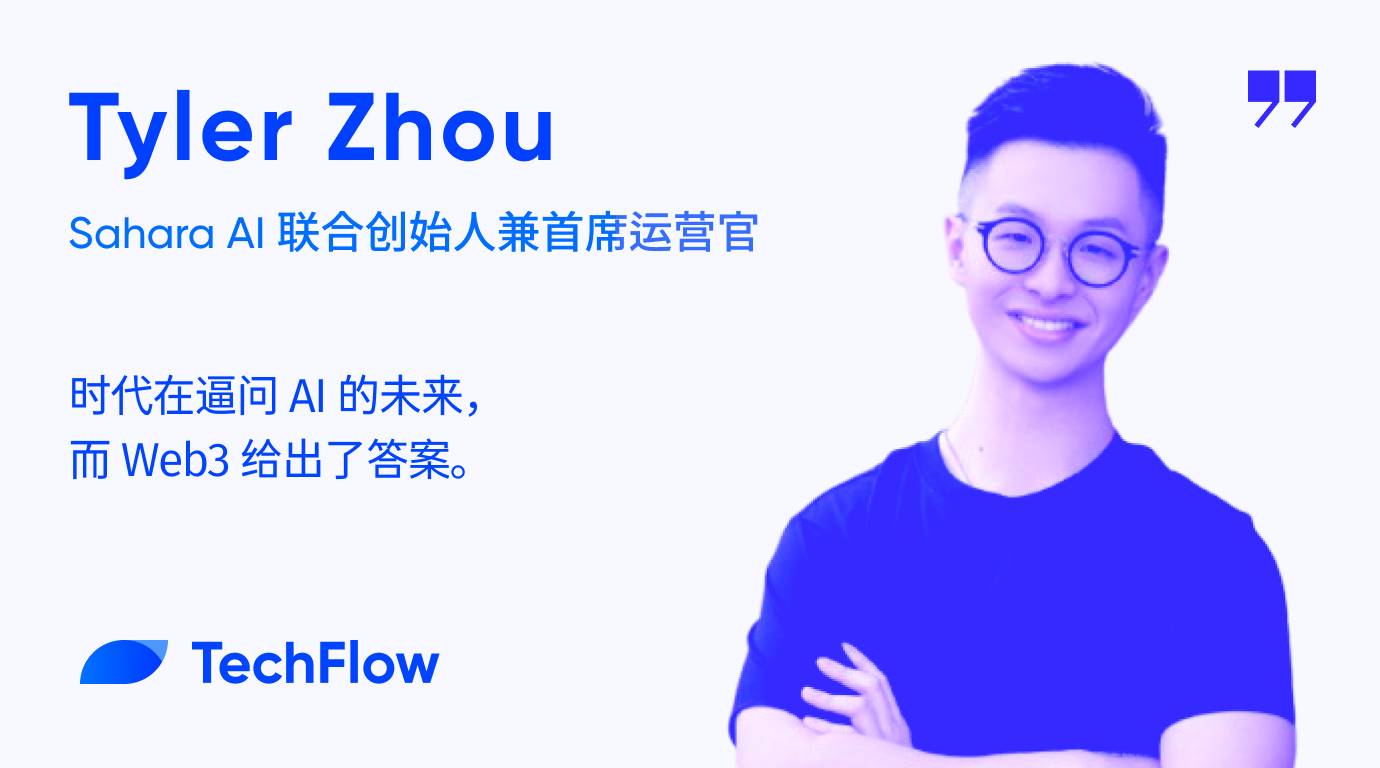
The Core Opportunity of AI: A Tool for Real Benefits, Benefiting Every Participant
Deep Tide TechFlow: Thank you for your time. Sahara AI has received a lot of attention this year. Could you please briefly introduce Sahara AI?
Tyler:
When people ask me what Sahara AI is, my favorite answer is: Sahara AI is the AI of the new era.
This is not a lofty concept. Our original intention in creating Sahara AI is very simple: to allow everyone interested in AI to truly participate. Whether you are an ordinary user hearing about AI for the first time, a developer already writing code, or even an AI enterprise, you can find your place in the Sahara AI ecosystem.
Currently, our platform has over 3.2 million accounts, with daily active users exceeding tens of thousands. What are these users doing?
Some are making money through data labeling, some are deploying their own trained AI models, and some enterprises have found customized AI solutions here. Many users tell us, this is the first time they feel that AI is no longer an unattainable thing, but a tool that can bring real benefits to themselves.
This genuine user demand also explains why we have received support from so many top exchanges. The market is smart because it sees an ecosystem that is truly creating value.
Deep Tide TechFlow: Can you share some of your experiences before creating Sahara AI? What insights drove you to create the Sahara AI project? Were you chasing a trend, or was it based on a deeper belief?
Tyler:
In the years I spent as an investor, I specifically studied AI and reviewed hundreds of AI projects and products across Web3 and Web2.
After ChatGPT became popular in early 2023, I noticed an interesting phenomenon: the entire AI data labeling industry suddenly faced a supply shortage. Before that, traditional data labeling costs had always been high, especially for projects dealing with complex datasets. Just preparing the data was a headache for many small and medium-sized teams, and quality was hard to control, often leading to inconsistent labeling.
In terms of revenue, the traditional model involved platforms charging clients high fees, while data labeling workers received very low returns, resulting in an imbalanced value distribution that was problematic in itself.
In my view, the core opportunity lies not in "creating a new tool application," but in redesigning the value distribution mechanism of AI. If we can reconstruct this process using Web3 methods, allowing people from around the world to participate, ensuring contributors receive fair compensation, and making the entire process transparent and traceable, we can address both the supply shortage and the unreasonable value distribution.
At that time, I discussed this idea with another co-founder of Sahara AI, Professor Sean, and found that our thoughts were very aligned. He saw the bottlenecks in AI development from an academic perspective, while I identified the issues with the business model from an investment perspective. The combination of these two viewpoints formed the basic framework of Sahara AI.
It can be clearly stated that the establishment of Sahara AI is absolutely based on belief and has nothing to do with chasing trends. From the very beginning, Sahara AI has carried a mission: to truly integrate the development of AI into everyone's life and to benefit every participant.
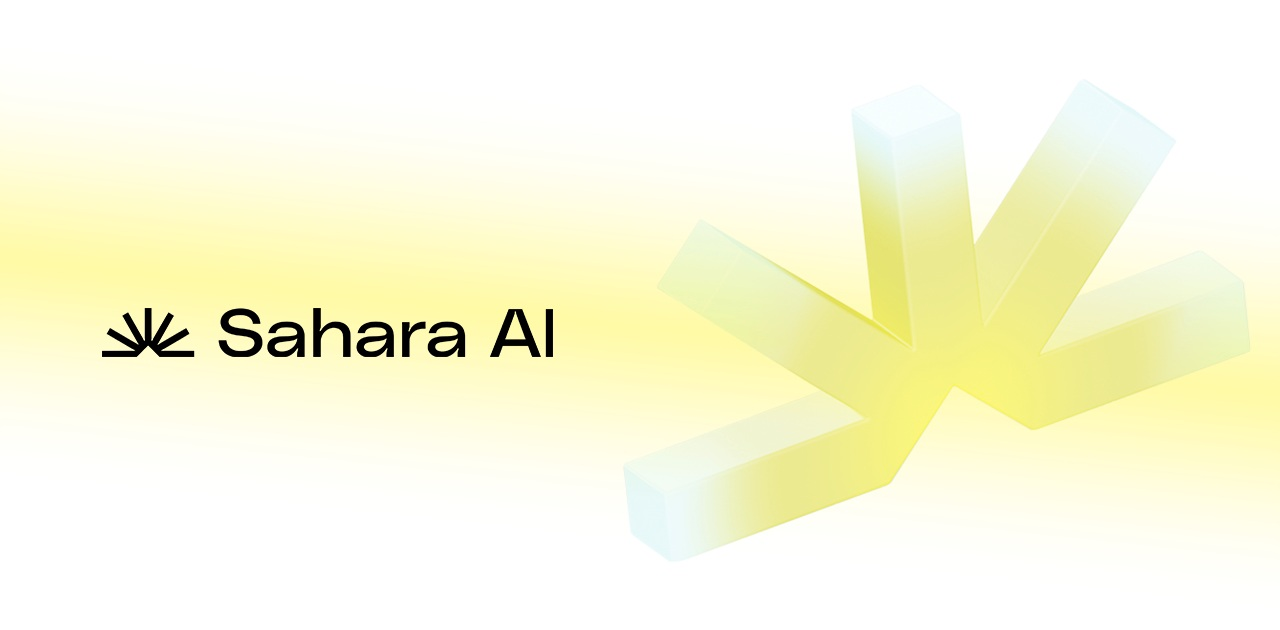
The Next Big Direction for AI Will Definitely Be in Web3
Deep Tide TechFlow: Some opinions suggest that Web3 AI is fundamentally useless and that the projects are not very promising; while others believe that the next big direction for AI will definitely emerge from Web3. What is your view on these two completely different statements?
Tyler:
Based on the thoughts I just shared, I can understand both of these completely different viewpoints.
Frankly speaking, I understand why some people think Web3 AI is useless. There are indeed too many projects on the market that simply package existing AI tools and issue tokens; this approach certainly has no real value.
But I firmly believe that the next big direction for AI will definitely be in Web3, because I think the most critical issue facing AI today is unreasonable value distribution, and the greatest value of Web3 lies in allowing every contributor to receive their deserved rewards. Additionally, AI itself requires global collaboration; data comes from all over the world, computing power is distributed in different places, and developers are also global. Traditional centralized models find it difficult to achieve this kind of open collaboration, but Web3 exists precisely to solve this problem.
Based on this, what Sahara AI is doing is actually very straightforward: we have built a complete infrastructure to support this new collaborative model, allowing hundreds of thousands of daily active users to truly collaborate and create value on our platform, while also establishing a sustainable economic cycle to ensure that every participant receives reasonable compensation.
This future has not yet fully arrived, and it is precisely the kind of people like us who need to create it.
Deep Tide TechFlow: In the past two years, many AI projects have emerged, but their performance in the secondary market has been lackluster. How do you interpret this phenomenon?
Tyler:
In each market cycle, the points that people FOMO over are different.
Take Pyth Network as an example; everyone knows that oracle technology is a big direction, and investors are optimistic about it, but the token price performance was average in previous years, and the market was not yet mature. Just a few days ago, the U.S. Department of Commerce announced a partnership with Pyth Network to put key economic indicators like quarterly GDP on-chain, which has brought global attention to Pyth Network, and its price has doubled.
It's like in 2010 when everyone knew that electric vehicles were the future, and Tesla's concept was advanced, but those who bought Tesla stock during those years found it hard to endure. It wasn't because electric vehicles weren't valuable; it was that battery technology wasn't mature enough, charging stations weren't widespread, and the entire ecosystem needed time.
Web3 AI is similar to oracles; they are not just a single track but are underlying technologies that can change the way the entire industry operates. It's like how smartphones didn't just add a touchscreen but restructured the entire digital life. This kind of thing that can drive fundamental evolution in the industry will definitely have its day of explosion.
The current challenge is that the infrastructure is not yet complete, and there are too few projects that can successfully implement a business model. Most AI projects are still at the conceptual stage and have not solved real problems, so the market will naturally not buy into them.
But this is precisely the opportunity. We are currently preparing the foundational conditions before the real explosion arrives, so that when the market truly begins to pay attention to AI, Sahara AI will have already accumulated users, achieved data breakthroughs, and built a complete ecosystem. At that time, the value will naturally be reflected.
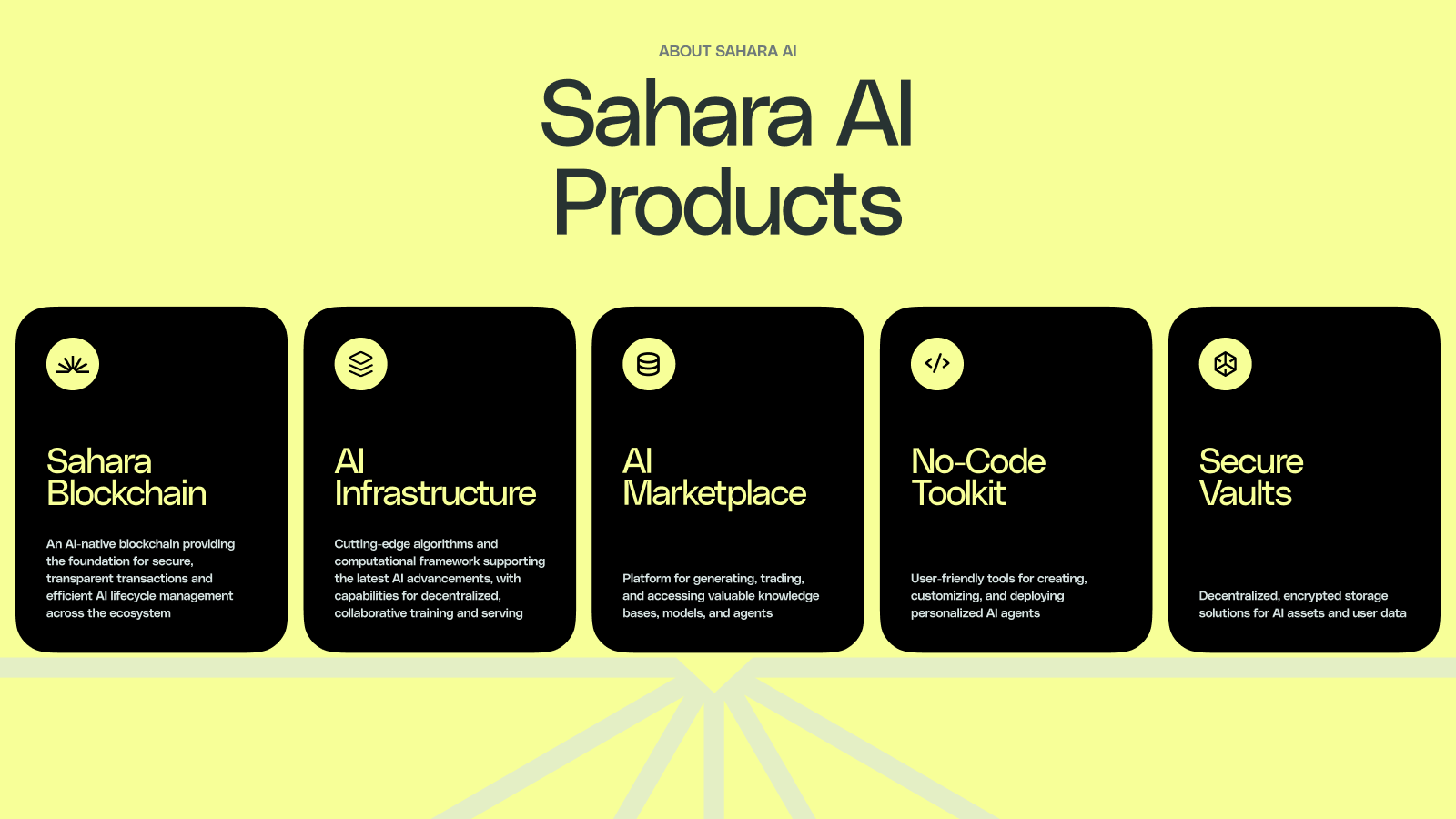
Implementing a Sustainable Business Model, Bringing AI into Daily Life
Deep Tide TechFlow: As the only AI project listed on both major Korean exchanges, how do you view Sahara AI's influence in the Korean market? And in the "new era AI" concept you shared, where do you think Sahara AI stands?
Tyler:
The most direct feedback comes from users, and the feedback from the Korean market is the most convincing: on Upbit, $SAHARA has repeatedly surged to the top three in trading volume, and trading activity has remained high. Korean users are indicative; they are voting with real money, conveying to the broader market: Sahara AI is the AI representative they have chosen.
Now, we have millions of users active on the platform, many of whom earn $SAHARA rewards through data labeling and then use these tokens to do more within the ecosystem. In the future, tokens will be applied more broadly in AI agent calls, AI asset access, and authorization, creating an internal economic model that allows participants to truly feel the practical effects of the tokens. Coupled with the team's background and execution capabilities, this brings more confidence to the community.
From a business perspective, I believe we are the only AI project that has successfully implemented a sustainable business model. Sahara AI not only has over 40 enterprise clients on the B-side paying for our services, but C-side users can also genuinely earn money on our platform. We do not rely on subsidies to maintain a false prosperity; we only create a healthy value cycle.
It may be too early to talk about being a leader; the AI track has just begun, and many excellent projects will surely emerge in the future. But I believe that 5 to 10 years from now, there won't be many AI projects that remain, but a few will become very large. Projects that rely on conceptual hype will gradually disappear, while those that truly solve infrastructure issues and build sustainable models will become stronger.
What Sahara AI needs to do now is to continue solidifying the foundation, allowing more people to participate in the new era of AI through us. As for whether we can ultimately become a true leader, time will provide the answer.
Deep Tide TechFlow: So what will Sahara AI do next? Could you share Sahara AI's future plans and what you are preparing to do?
Tyler:
Sahara AI's upcoming focus will be on how AI can truly enter people's daily lives.
You see, ChatGPT now has 800 million users weekly, and ordinary people are starting to say, "I'll ChatGPT that," just like they used to say, "I'll Google that."
As these AI models become increasingly aligned with people's thinking patterns, businesses are also beginning to genuinely use AI to conduct business and solve real problems, making high-quality training data increasingly scarce. Everyone wants to train their own models to make AI better understand their business, but high-quality, context-specific data is hard to find, and most of it is controlled by a few large platforms. This presents us with an opportunity.
What Sahara AI aims to do is seize this window of opportunity, so we will focus on two directions moving forward:
First, promote the DSP model across the entire AI value chain, such as financial data, DeFi trading, imaging, content creation, etc.;
Second, turn this data into tradable assets.
We officially launched DSP at the end of July. In addition to our early partners like Myshell and Camp Network, we have added over a dozen project partners that are gradually integrating into DSP. Since the testnet began, the platform has accumulated over 200,000 contributors, completing 8 million data labeling tasks with an accuracy rate exceeding 92%. Through our dual reward mechanism, the total reward pool on the platform has exceeded hundreds of thousands of dollars, including rewards from partners like Myshell and Camp Network.
We have discovered an interesting phenomenon: the demand from enterprise clients for this transparent data service is much greater than expected. More and more projects are lining up to integrate into DSP because they find they can obtain higher quality data through us, and the entire process is traceable and verifiable.
The entire AI industry is still in the infrastructure construction phase, but I can sense that a turning point is approaching. When AI truly begins to be commercially applied on a large scale, the value of data will grow exponentially.
The layouts we are making now are to prepare for that moment.
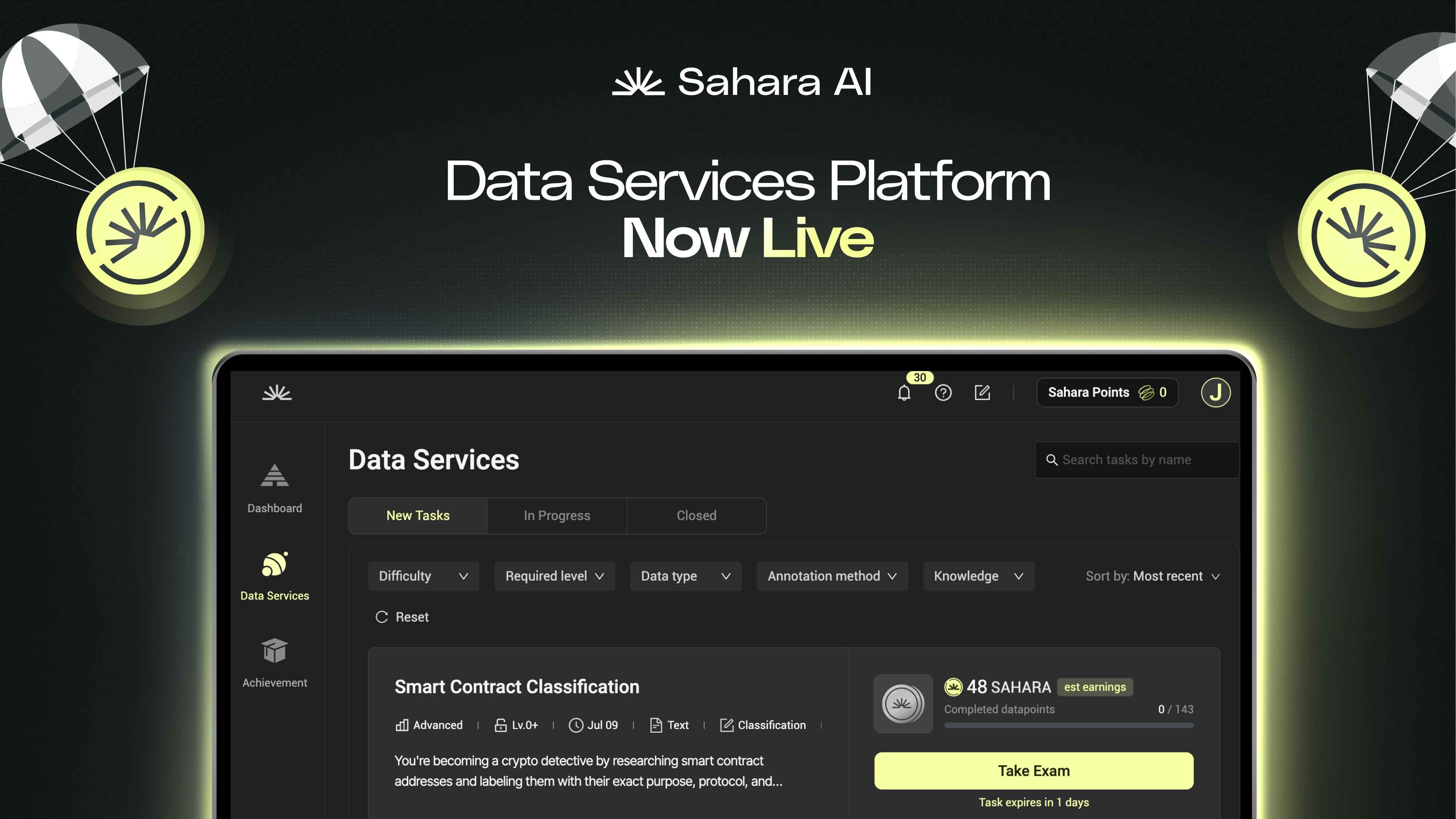
Deep Tide TechFlow: As a successful entrepreneur, what are the most troublesome issues you face in the current challenging entrepreneurial environment?
Tyler:
The question I think about the most every day is: How can participants earn money in Sahara AI?
Many people might think that the hardest part of entrepreneurship is financing, marketing, or market entry, but for me, these are not the most important. The question I ponder the most is: Are people really feeling that their AI experience is smoother, opportunities are fairer, and they are finally seeing returns for the value they contribute because of Sahara AI?
To understand this, I registered many small accounts and observed discussions in communities and on X: when I see someone saying the product is useful and they earned money through labeling, I feel happy; when I see someone complaining about a feature being unusable, I immediately note it down for the team to improve. Many times, I even engage in discussions in various trading groups to understand their true thoughts.
For me, feedback is more important than anything else because I want users to feel for the first time: AI is no longer just a privilege for experts, but something they can also participate in and benefit from, and data contributors can realize that labeling work is a valuable asset, no longer treated as cheap labor.
I am very clear in my mind that whether it is our community members or token holders, they follow us hoping for actual participation and returns, not just to hear some grand vision. If an ordinary user spends half a day on our platform and ends up with nothing, then all our technology and ideas are meaningless.
This may sound less grand, but I think this is the most important thing. Only when users truly benefit can Sahara AI genuinely move forward in a meaningful way.
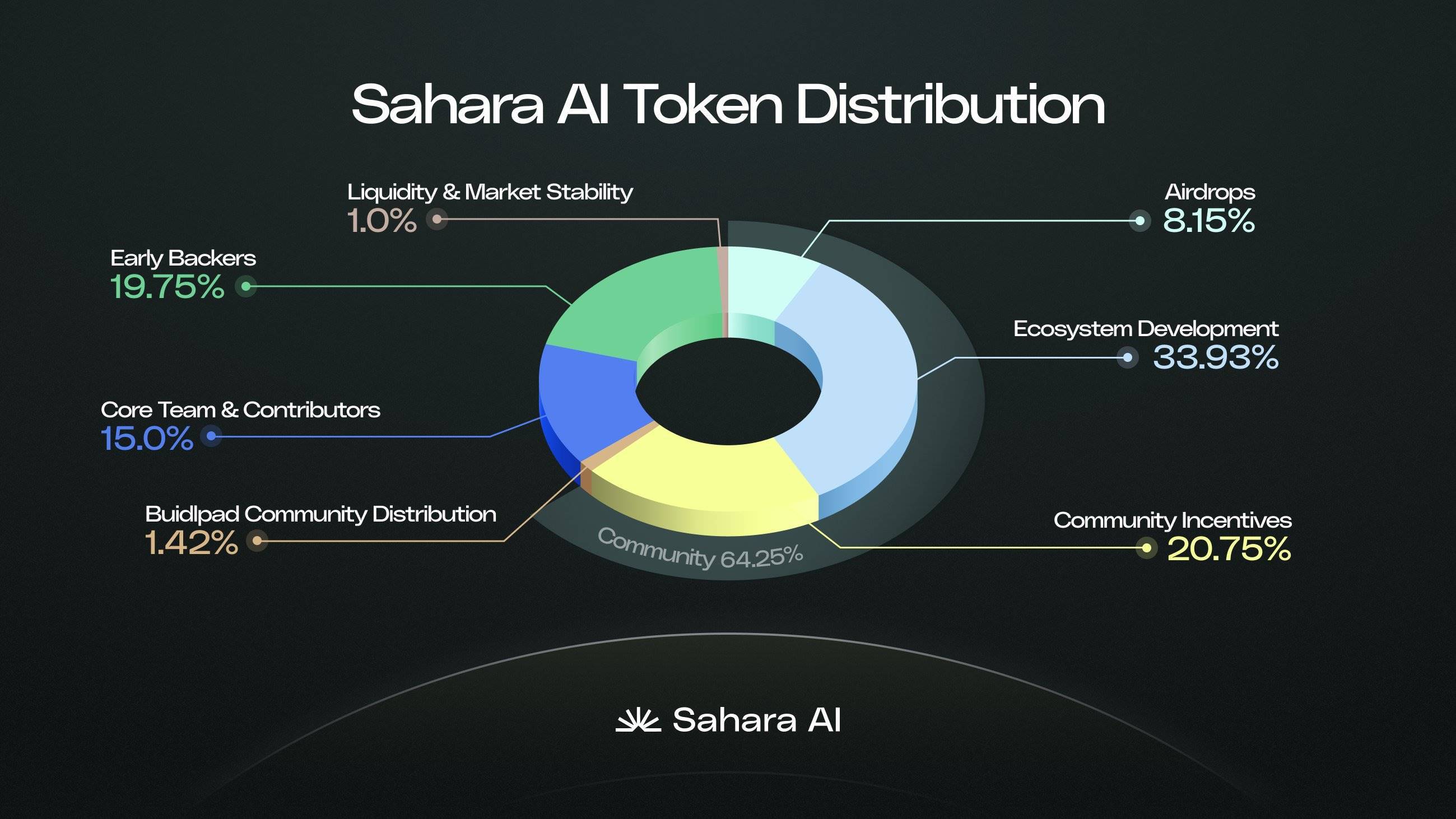
Deep Tide TechFlow: In the context of the accelerating integration of Web2 and Web3, based on Sahara AI's rich accumulation in Web2 AI and Web3 AI, what opportunities do you see for AI in the future? What challenges lie ahead?
Tyler:
Frankly speaking, the integration of Web2 and Web3 is indeed happening in the AI field, but this process is slower than expected.
The biggest opportunity I see is AI truly entering daily life and having its value recognized and distributed through Web3.
For example, when investing, you might spend a lot of time watching market trends and analyzing data, but in the future, an AI assistant will keep an eye on the market for you, alerting you to opportunities and even giving you direct suggestions. When creating content or writing, AI will not only write articles but also help you promote and interact with fans, and even handle business collaborations.
More importantly, Web3 allows AI to be a personal asset, not just a tool. Just like renting out a house to make money, the AI you train and the data you contribute can also earn you money when others use it. For instance, if you use AI to analyze a certain industry, you can receive ongoing income when others call upon that model.
We are collaborating with well-known projects to create solutions that truly bring AI into daily life, such as providing users with AI smart suggestions when using wallets and offering creators a full suite of AI solutions from content generation to revenue management.
Of course, the challenges are also evident: technologically, current blockchain performance does not meet the high-frequency calling needs of AI; from a user experience perspective, there are still barriers for ordinary people; and from a business model perspective, how to make this new value distribution method truly sustainable also requires time for validation.
These challenges are actually opportunities for Sahara AI. We are currently addressing these issues in advance, ensuring that the infrastructure can support it, allowing ordinary users to use it without needing to understand the technology, and achieving a sustainable business model.
I believe that in a few years, professional knowledge and even daily behavior patterns may become valuable AI components, and Sahara AI is likely to be the infrastructure for this new economy.
Even if you do not actively embrace AI, AI will reshape your life.
Deep Tide TechFlow: In the face of opportunities and challenges, what advice do you have for ordinary people to participate in AI?
Tyler:
Regarding how ordinary people can participate in AI, I believe this is not a question of choice, but a matter of time.
Just like the transition from Yahoo to Google, at first, everyone thought search engines were pretty much the same, but gradually you would find that Google was indeed more user-friendly, and then everyone around you was using it, so you naturally switched over.
AI is the same; in the coming years, it will gradually permeate various scenarios, and you will use it when investing, working, or creating. This is a very natural process.
For those who want to get involved early, Sahara AI currently provides a good entry point.
My advice is simple: If you are interested in AI, why not give it a try now? The cost is low, and the learning curve is not steep, but it can help you become familiar with this new way of working in advance. Just like those who started using Google early, it may seem like just switching search engines, but they gained a better experience.
I firmly believe that even if individuals do not actively embrace AI, AI will actively integrate into and reshape our lives. In the future, whether in work, learning, investing, or socializing, AI is gradually becoming an indispensable part of it.
What Sahara AI hopes to provide is such an entry point to experience and feel AI, allowing users to enter this new phase with the lowest cost and in the most natural way.
免责声明:本文章仅代表作者个人观点,不代表本平台的立场和观点。本文章仅供信息分享,不构成对任何人的任何投资建议。用户与作者之间的任何争议,与本平台无关。如网页中刊载的文章或图片涉及侵权,请提供相关的权利证明和身份证明发送邮件到support@aicoin.com,本平台相关工作人员将会进行核查。




